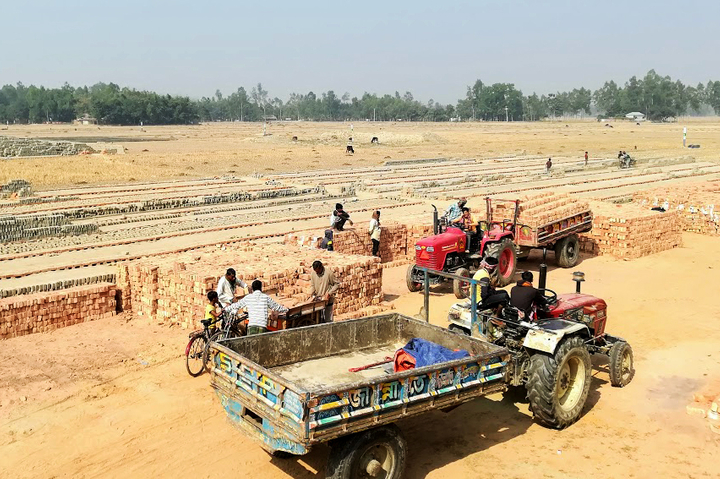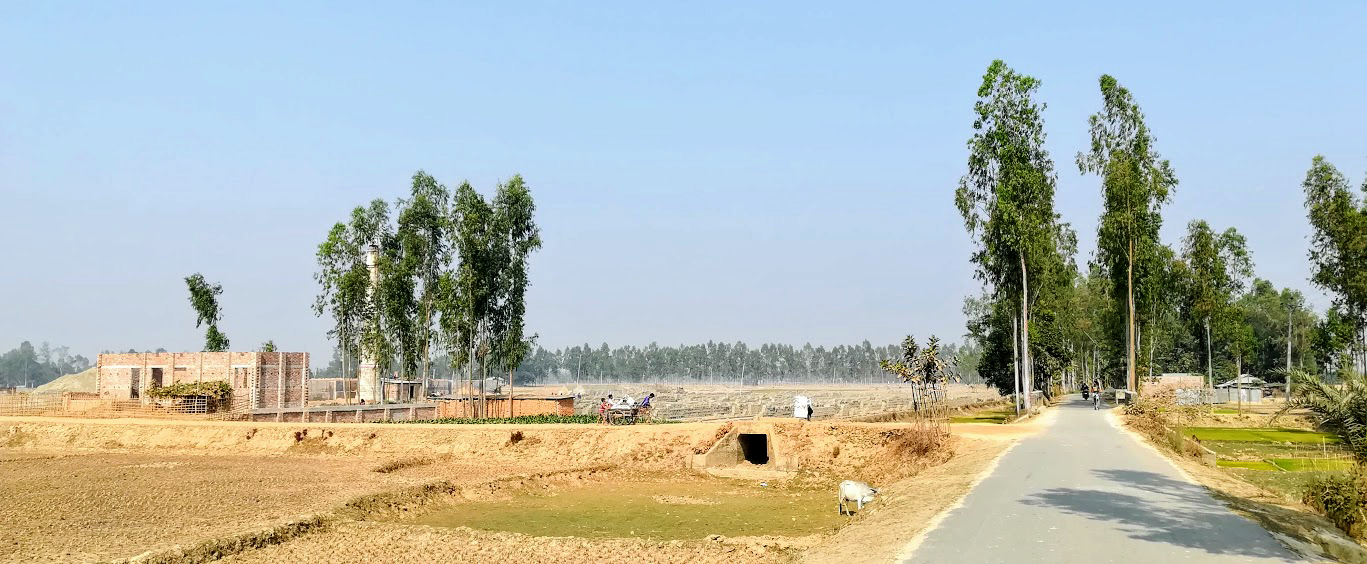Rural communities in Bangladesh continue to face climate and health challenges, writes Shahinur Islam.
Farmer Purnachandra of Tularampur has been suffering from asthma for some time. At the end of the month of Ashwin (autumn), he could breathe easily again and chant the name of “Mahaprabhu” (great lord). Rickshaw-puller Pavel Pradhan's five-year-old son also suffers from the respiratory disease, while Morzina Begum, a mother of three, recently died without treatment.

Birendranath Kumar, an agricultural worker, is now bedridden with asthma in the neighbouring village of Pawanpara. The body of the strong man who used to carry a palanquin is now skeletal. He looks at the 'Bhuter Pukur' Mahasvashan Ghat (cremation grounds) on the western side of his house, thinks of his dead relatives, and secretly sheds tears.
This is the picture of Pirganj Upazila of Rangpur district in northern Bangladesh. Asthma patients are increasing alarmingly in the 308 villages of the upazila. Women, children, and elderly people are most affected by this disease, but it is not hereditary. Asthma here is due to air pollution.
According to the National Chest Diseases Institute in the capital Dhaka, 30 percent of the patients who come to the hospital for treatment suffer from asthma. A National Asthma Prevalence Study carried out in 1999 found that an estimated 7 million people, including 4 million children, were suffering from asthma-related symptoms. The number of patients has increased by 2 million in 10 years. However, no new figures were released in 2020 due to the Coronavirus pandemic.

The brickfields
Many brickfields have been built on the fertile crop lands around the two villages in Pirganj which depend on an agricultural economy. Although the government has passed a law to encourage the use of alternative bricks in construction, it is not working. Bricks are being made illegally by burning wood and coal in prohibited kilns near the locality.
According to Babul Alam, Deputy Director of the Ministry of Environment, Forests and Climate Change, only 18 out of 565 brickfields in six upazilas of Rangpur are operating in accordance with official guidelines, while six are operating using traditional methods. The black smoke emitted by the kilns operating illegally causes great damage to public health and the environment.
All in all, 7,902 environmentally destructive brickfields are running freely in 64 districts of Bangladesh. In October when the rains subside, fires start burning in the lowlands, emitting plumes of black smoke into the cloudless blue sky.
Climate change
According to the Housing and Building Research Institute, 2 million tons of firewood and 2 million tons of coal are burned in brickfields in Bangladesh every year. From this, about 9 million tons of greenhouse gasses are emitted annually.
This is contributing to climate change and the amount of rainfall is decreasing, causing desertification in the agriculture-dependent region. People in the area struggle after sudden heavy rains or flash floods. To survive the disasters, farmers sell their old houses, topsoil from agricultural land, and cattle.
Most self-educated farmers believe that as the groundwater depletes in their land, so does crop production. To raise the water level and to make temporary profit by lowering the land, farmers sell the topsoil to the brick kilns.
The responsibility of the government
Habibun Nahar, Deputy Minister of the Ministry of Environment, Forests and Climate Change, said that brickfields are being rebuilt even after they are demolished. In this situation, the government, especially the Department of Environment, has to play a responsible role in stopping illegal brickfields from reopening.
Shahid Ullah Khandaker, Secretary, Ministry of Housing and Public Works, said it was the ministry’s responsibility to ensure that brick substitutes are used in the construction industry. According to researchers, there is no need for burnt bricks in the country. It is possible to meet the demand of the construction industry using blocks made with sand and soil dredged from rivers.
The Secretary added that the Department of Public Works has approved the use of brick substitutes in public works after the law was passed on the use of alternatives to burnt bricks. The results will be better if sand-and-soil blocks are used in the development activities of education and health engineering, local government engineering, and other government agencies.
In 1980s, all houses in the village had native trees growing on their land, ranging in age from 50 to a hundred years. Most of the-old trees have now been cut down and sold to the brick kilns. Furthermore, farmers who have sold their topsoil are not able to grow crops in their fields and are moving to other places by selling their land. Many farmers switch jobs and move to cities, leaving children, women, and the elderly behind.
Ohidul Islam Sohail, Field Coordinator, Concern Worldwide, said they are facing many problems due to the impact of climate change. Many disadvantaged villagers have taken up positions in community resilience in Sundarganj upazila of Gaibandha district and Hatibandha of Lalmonirhat district just to survive. The total number of beneficiaries is 82,72 and 4,372 of them are extremely poor. They have relocated to the banks of River Teesta, which flows through the central part of Rangpur division. Every day, the number of unemployed people is increasing.
Meanwhile, there is no specialized hospitals for asthma patients in the rural areas. That is why many people like Birendranath Kumar are crying in silence, thinking of their dead relatives while suffering from asthma.





